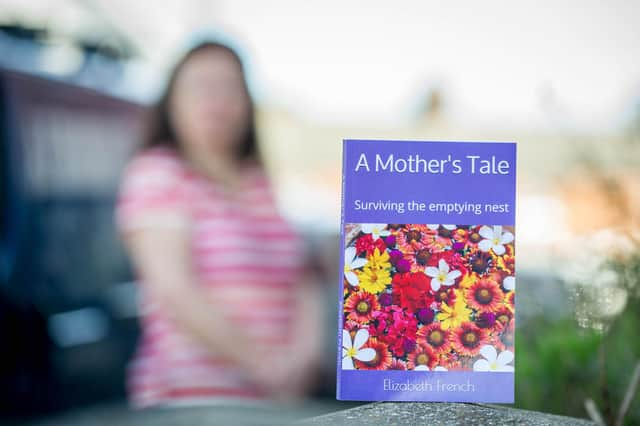Emsworth mother speaks out about surviving the pain of empty nest syndrome


At 18 , most leave with the intention of never moving back home.
As they revel in their newfound freedom, parents – who have nurtured, cared for and developed their once young children into adults – can be left bereft.
Advertisement
Hide AdAdvertisement
Hide AdAnd one mother-of-three from Emsworth says when her children left home, she never felt more alone. Her book, A Mother’s Tale, is a diary of how she survived empty nest syndrome and she hopes it will bring comfort to other mothers who are going through the same experience.
She writes under a pseudonym, Elizabeth French, to protect her children’s identity. The 58-year-old, who now lives in Petersfield, says: ‘It’s a very personal book with regards to my three children.
‘It’s a genuine diary of when they left and went to university. I thought a diary would be a distraction and it would be a place to talk my feelings into.’
Elizabeth, who works as a business consultant, says she never knew how painful it would be until they were gone, and dropping her children off at university was heartbreaking for her.
Advertisement
Hide AdAdvertisement
Hide Ad‘The moment when I walked back to my car after dropping them off, I knew then it was going to be painful,’ she explains.
‘That child has been everything to you and has been in the house nearly all of the time. When they’re low, you’re low; when they’re happy, you’re happy. And then suddenly they’re not there.
‘What makes it worse, is that they’re happy to go and live their independent lives. It makes you think they’re ungrateful for their lives here but you shouldn’t feel like that and trust the relationship will survive.
‘Empty bedrooms were the hardest to see. They leave in such a hurry and then you have it to clean up.’
Advertisement
Hide AdAdvertisement
Hide AdLooking back now, Elizabeth had devised coping mechanisms to help with the loss. All three of her children – one son, 27, and twin girl and boy, both 24 – left home at 18 and she says each time was equally as awful.
‘I realised I needed to go back to the things I started before I had my children,’ says Elizabeth.
‘Your relationship with your children changes when they leave.
‘It forces you to reconnect with old friends. I started meeting those people and close family. I transformed friendships from just people I knew through work to best friends.
‘You have to rebuild your life.’
Advertisement
Hide AdAdvertisement
Hide AdTo add to the pain, Elizabeth’s marriage with her husband did not survive the period when their children moved out.
‘When there were just two of us, we realised we were very different people.
‘During my divorce, I left the family house. That was quite helpful because it didn’t bring back memories every time I stepped through the door.’
After speaking to several other mothers about her experience, Elizabeth found many could resonate with her.
Advertisement
Hide AdAdvertisement
Hide AdShe explains: ‘Having spoken to many people, I think this pain happens to the vast majority of mothers when their child leaves home.
‘And when I speak to other women in particular, I think we feel the pain differently to men.
‘A mother’s bond is different to a father’s bond. But that doesn’t mean my husband didn’t find it tough.
‘Someone wrote a review on my book the other day which said something similar to “although it’s a mother’s tale, fathers feel this too”.’
Advertisement
Hide AdAdvertisement
Hide AdHer children – whose real names have also been changed – were ‘incredibly supportive’ of publishing A Mother’s Tale, which went on sale in December 2019.
Elizabeth says: ‘I think they didn’t get my pain initially, but they do now.
‘They understand that the book was good for me and hope it will help other mothers.
‘The feedback has been incredibly positive.’
Now, Elizabeth’s relationship with her children has naturally changed as they have grown and developed their own lives. She says: ‘I now see my children around once a month and we still meet up as a family.
Advertisement
Hide AdAdvertisement
Hide Ad‘Listening to their voices, watching them move on in life brings me joy more than before.’
To buy a copy of A Mother’s Tale, go to amazon.co.uk.
What is empty nest syndrome?
Although it is not described as a clinical condition, empty nest syndrome is the immense feeling of grief or loss when children leave home for the first time.
Young adults moving out from the family home is generally a normal and healthy event and therefore the symptoms of empty nest syndrome often go unrecognized. This can result in depression and a loss of purpose for parents.
Like Elizabeth says, it’s important to prepare for your children to leave home. Relate (relate.org.uk) have listed three useful tips to help cope with empty nest syndrome.
Advertisement
Hide AdAdvertisement
Hide Ad- Prepare now for your children to leave if they are planning to go to university or move out to live on their own.
- Focus on the positive steps that they are taking in their life.
- Acknowledge that you will miss them. Be honest that although it will be a challenge at first, it will also be a great opportunity for growth and adventure. This will help your children feel able to grow and move on.
If you're worried about the impact of your children leaving home on your relationship, Relate can help through counselling.
Go to their website for more information.